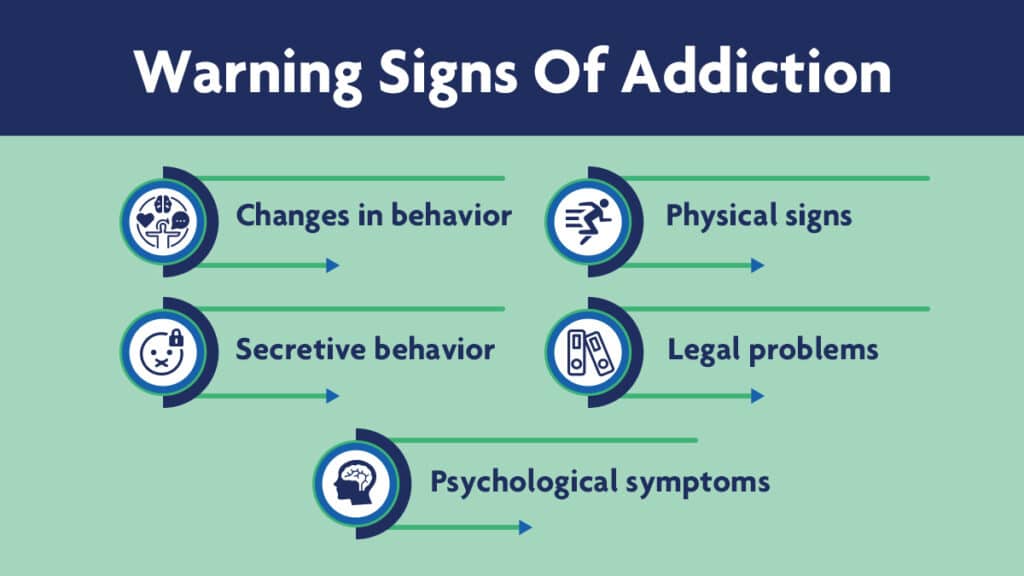A family member struggling with addiction can deeply impact the dynamics and well-being of your entire household. Misuse of substances like alcohol, cocaine, or opioids often leads to mental health problems, financial issues, and strained relationships.
It can be challenging to set healthy boundaries when dealing with a loved one who struggles with substance addiction. You may experience guilt and feel unsure of how to proceed.
However, it is possible to rebuild the bonds by gaining a full understanding of drug misuse and addiction and by learning how to recognize the signs. In this article, we will explore those signs and guide how you can help your loved one struggling with addiction.
Key Takeaways
Addiction is a serious illness, but you can help your family members break free from it by using the right approach. Here’s what you need to know:
- To support your loved one, look for the symptoms of addiction, like changes in behavior and overall health.
- Educate yourself about addiction to approach the situation with empathy and knowledge.
- Support them during recovery by attending family therapy sessions and guiding them in case of relapse.
- Protect yourself by contacting a counselor or therapist for help during these difficult times.
Our teen treatment center can help your teens to win their battle against addiction. Contact us at (845) 479-6888 to learn about our services.

The Important Role Of Family In Overcoming Addiction
Family plays a pivotal role in the journey to overcome addiction. Through tough love and unwavering support, they stand by their loved ones during the hardest times. Addressing alcohol abuse within the family dynamic requires open communication and understanding.
Family therapy provides a safe space to navigate these challenges, addressing the individual’s struggles and the impact on the entire family unit. Additionally, families often provide financial support for treatment. They ensure that their loved one receives the care they need to overcome alcohol use disorder.
Despite the stigma and shame often associated with addiction, families offer unconditional love and acceptance. They offer motivation to individuals to push through the toughest moments.
Warning Signs Of Addiction: What You Should Know
Recognizing the signs of drug abuse is crucial for early intervention and support. Understanding these symptoms can prevent the worsening of substance abuse habits and their negative impact on people and their surroundings. Here are six key signs to watch for:
Changes in behavior: Erratic actions, mood swings, or sudden isolation.
Physical signs: Unexplained weight loss, dilated pupils, or track marks.
Secretive behavior: Hiding activities, lying about whereabouts, or avoiding conversations.
Psychological symptoms: Anxiety, depression, or sudden bursts of energy.
Legal problems: Arrests, fines, or encounters with law enforcement.
Social withdrawal: Neglecting responsibilities, avoiding social gatherings, or distancing from friends and family.
By being alert to these signs, you can identify when your child may be struggling with active addiction. Remember, addressing substance use issues can make a significant difference in someone’s life.
Helping Vs. Enabling A Family Member
Understanding the difference between helping and enabling a loved one with alcohol addiction is necessary for providing effective support. Helping involves actions that encourage positive change and recovery. That can include offering emotional support, listening without judgment, and assisting in accessing treatment options.
On the other hand, enabling involves behaviors that unintentionally perpetuate the addiction and hinder recovery. That might include making excuses for their actions, giving them money for alcohol, or covering up their behavior. While helping fosters progress and encourages healthier choices, enabling maintains the status quo of addiction.
Setting boundaries and avoiding enabling behaviors is important, even though it may be difficult. Family members can play a significant role in their loved one’s recovery while maintaining their well-being and social life by providing healthy support and encouraging positive changes.
Tips To Talk To A Loved One About Their Addiction
When you need to talk to a member of a family about their drug addiction, it’s important to prepare yourself for the conversation and know what to say. Here are some tips to help you get through it:
Educate Yourself
Before starting a conversation, take the time to educate yourself about addiction issues and their impact on individuals and families. Understanding the nature of substance use disorder can help you approach the discussion with empathy and knowledge.
Gather Information
Collect relevant information about your family member’s behavior and the consequences of their drug addiction. That may include instances of substance misuse, changes in mood or behavior, and any adverse effects on their health or relationships. Remember that addiction is a family disease, and it’s okay to ask for help and support from others who have been through similar situations.
What To Say To Them
When you’re ready for the conversation, approach your family member with empathy and understanding. Use easy words to express your concerns and let them know you care about their well-being. You can say things like, “I’ve noticed that you’ve been struggling with alcohol misuse, and I’m worried about you.”
You can also say, “I want you to know that I’m here to support you and help you get the treatment you need.” You need to help them understand the negative consequences of drug problems and openly discuss the benefits of treatment programs like detox.
How To Handle Their Reactions
It’s important to be prepared for your family member’s reactions, including denial, anger, or sadness. Remember to remain calm and compassionate and listen to their perspective without judgment.
Offer emotional support and let them know that you’re there for them no matter what. You can also suggest seeking professional help or attending a treatment facility where they can get the specific needs they require.
Supporting A Family Member In Addiction Recovery
The best ways to support a family member during recovery involve attending support groups and providing love and encouragement, especially in difficult situations like relapse. Remember, there’s no one-size-fits-all approach to recovery, but with patience, your loved one can overcome the challenges of addiction and live healthier lives.
Attend Family Support Groups
Family support groups like Al-Anon Family Groups are essential during recovery. These groups offer support and advice to family members of people struggling with drug abuse. Attending these support groups can provide a safe place to share experiences and learn from others facing similar situations.
Offer Drug-Free Setting at Home
Creating a drug-free setting at home is crucial for supporting a family member in recovery. It’s important to remove any triggers or temptations that could lead to relapse. A supportive and loving environment can help individuals feel more secure in their recovery journey.
What To Do When Relapse Happens
Relapse can be challenging for the individual in recovery and their family members. It’s essential to offer love and support without judgment. It is essential to encourage the individual to seek help and recommit to their treatment process. Remember, relapse is often a part of the recovery process, and it’s important to remain hopeful and supportive during this time.
In difficult situations like relapse, attending family support groups can offer valuable advice and guidance. These groups can provide insight into coping mechanisms and strategies for supporting a loved one through the ups and downs of recovery.
Taking Care Of Yourself
It’s important to take care of yourself and prioritize your well-being, even when caring for a loved one. Seeking help and attending family therapy can help you better support your loved one while nurturing your mental and emotional health. Remember, self-care is not selfishness. It’s a necessary step towards a healthier and happier life for you and your loved one.
Seeking Help And Support For Yourself
Taking care of yourself is vital when supporting your teen or someone you care about through addiction recovery. It’s okay to acknowledge that you need support too. Seeking help from a therapist or counselor can provide you with the tools and coping strategies to navigate the challenges you may face. Remember, you can’t pour from an empty cup, so prioritizing your well-being is important.
Attending Family Therapy
Family therapy can incredibly benefit you and your loved one in recovery. It provides a safe space to highlight underlying issues, improve communication, and strengthen relationships.
Through therapy, you can learn healthy boundaries, effective communication techniques, and ways to support your loved one without enabling their addiction. Additionally, it offers an opportunity for healing and growth as a family unit.
Frequently Asked Questions (FAQ)
What are management strategies for drug abuse?
Managing drug abuse involves several strategies to address both the physical and mental aspects of addiction. One key approach is seeking professional help, such as counseling or therapy. Such sessions help you to understand and cope with underlying issues driving substance use.
Another strategy is creating a supportive environment by surrounding oneself with positive influences and avoiding triggers. Healthy habits like regular exercise and hobbies can help occupy time and reduce cravings. In some cases, medication-assisted treatment may be recommended to manage withdrawal symptoms.
How do I deal with a family member who refuses to admit they have a drug addiction?
Dealing with a family member who refuses to admit their drug addiction can be daunting. However, it is best to approach them with empathy and understanding, expressing your concerns without judgment. Encourage open communication and offer support by providing resources for addiction treatment.
Focus on setting boundaries to protect yourself and other family members from harmful behaviors. Consider staging an intervention with the help of a professional interventionist if necessary. Remember to take care of yourself emotionally and seek support from friends, support groups, or a therapist to navigate this difficult situation.
How do I deal with a drug-addicted family member or loved one?
Dealing with a family member or loved one with a drug addiction can be incredibly challenging, but it’s important to approach the situation with empathy and understanding. Motivate them to seek professional help and provide your support throughout their journey to recovery.
However, setting boundaries to protect yourself and your family from harm is important. You should consider seeking advice from a therapist or support group to cope with the emotional toll it may take on you. Remember that addiction is a complex issue, and recovery is a process that requires patience and persistence.
Discover Hope With Our Teen Treatment Center
Help your young one break free from addiction and learn new ways of living a healthy life at our teen treatment center.
We provide a holistic healing approach at our residential treatment, where teens receive 24/7 support and counseling to recover from drug abuse.
Through evidence-based treatment programs, we fulfill the needs of teens struggling to overcome addiction. Our trained staff offers counseling and family therapy sessions to help family members build bonds with loved ones with addiction.
Take the first step towards a better tomorrow. Learn more about our services and programs at (845) 479-6888.


